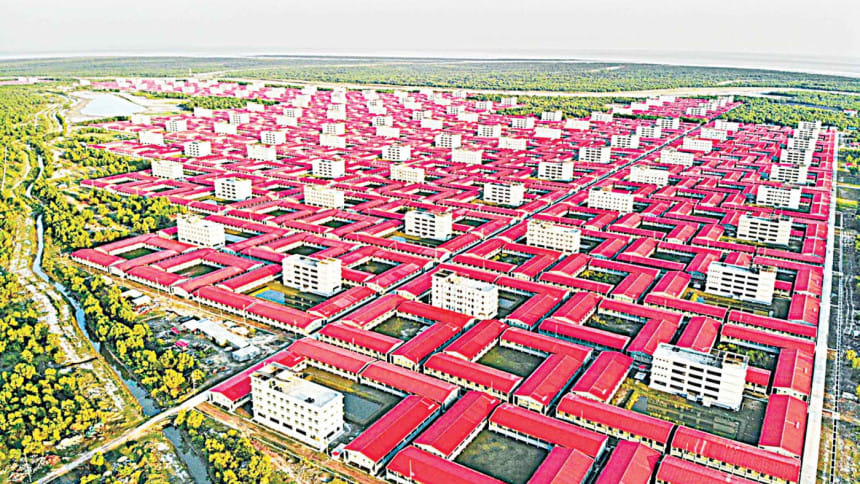Rohingya Relocation to Bhasan Char: All set with UN views put aside

While the United Nations and other development partners still wait for an independent assessment of the Bhasan Char housing project, the government prepares for relocating some 2,500 Rohingyas to the isolated island within a couple of days.
The move has triggered concerns among the UN and the development partners.
Talking on the issue, experts said relocating Rohingyas to Bhasan Char without the UN consent could risk the good reputation Bangladesh earned by sheltering the Rohingyas.
They were also not sure how funding for meeting the needs of the Rohingyas would be managed following their relocation. They stressed that any relocation must be safe, dignified and voluntary.
A UN source said the UNHCR requested the Bangladesh government late last year to allow a technical team to the island in Noakhali's Hatiya, but it did not receive any response.
"We have no clue as to why the team was not allowed there," the source told The Daily Star yesterday.
The Tk 3,100-crore housing project, funded with public money, was taken after some 750,000 Rohingyas fled a brutal military campaign in Myanmar's Rakhine and took shelter in Cox's Bazar since August 2017. They joined some 300,000 other Rohingyas, who had fled previous waves of violence in Rakhine.
Destruction of forests and hills and risk of landslides in Cox's Bazar prompted the authorities to choose the temporary housing site on Bhasan Char, which is around 37 miles off the coast of Bay of Bengal.
The project implemented by Bangladesh Navy has 120 cluster villages that are capable of accommodating one lakh Rohingyas.
Government sources yesterday told this paper that the authorities were preparing to shift the first batch of around 2,500 Rohingyas to the island from Cox's Bazar camps within a couple of days.
Around 66 tonnes of food and other necessary household items were taken to the island as of November 29, the sources said.
The houses have been built four feet above the ground with concrete blocks. The entire housing site is protected by a 13km-long flood embankment. There are also 120 cyclone shelters, which are planned to be used as schools, medical centres and community centres.
Government officials said there were large swathes of land that could be used for livestock and fish farming if the Rohingyas were relocated there. The refugees in the Cox's Bazar camps have a very little work to do now.
UN and several international aid agencies have, however, been opposing the relocation plan, saying Bhasan Char is an isolated island and people there would be dangerously exposed to cyclones.
At one point last year, the UN wanted to send an independent technical team to Bhasan Char to visit the project. Accordingly, a request along with terms of reference was submitted to the government.
In a statement yesterday, the UNHCR -- the UN refugee agency -- said it had not been involved in preparations for the relocation or the identification of the refugees and has limited information on the overall relocation exercise.
Since the government announced the project, the UN has offered to engage in constructive consultations aimed at better understanding of the relocation plan, the UN said, adding that it remains willing to continue dialogue in this regard.
The UN has consistently maintained that any relocations to Bhasan Char should be preceded by comprehensive technical protection assessments for reviewing the safety, feasibility and sustainability of Bhasan Char as a place for refugees to live.
It said it also spoke of the framework for protection and the assistance and services they would be able to access on the island. The United Nations is prepared to proceed with the technical and protection assessments, if permitted by the government, it said.
"These assessments would be the concrete next step in determining whether the UN can engage operationally with the government's Bhasan Char project.
"If so, further work would be needed in order to develop plans and budgets, in consultation with the government and national and international NGO partners, as well as with the international donors whose support makes the Rohingya humanitarian response possible in Bangladesh."
Meanwhile, European Union Ambassador to Bangladesh Rensje Teerink said the underlying important issue was that a UN technical mission to Bhasan Char was pending.
"We always said let's first see what mission brings. If the mission says it is totally safe and sustainable for these people to be relocated, then we can look how we can support this process. At the moment, we feel it is a bit premature because the missions have not taken place on the Bhasan Char," she said at a talk hosted by the Diplomatic Correspondents Association of Bangladesh yesterday.
Asked about the relocation move by the government when the UN waits for a visit by its technical team for assessments, COAST Trust Executive Director Rezaul Karim Chowdhury said Bangladesh risks losing the reputation it earned by sheltering the Rohingyas and the good relationship with UN.
"Our government should engage in dialogue with the UN on Bashan Char. The UN also should understand the challenges Bangladesh faces and facilitate the relocation. If necessary, more facilities can be added to what is there in Bhasan Char now," he told The Daily Star.
It will be difficult for the government to arrange food for the 1,00,000 Rohingyas and meet their other humanitarian needs if the international community is not involved in the process, he said.
"Can we manage it without the support of the international community?" he asked.
This correspondent tried to contact Foreign Secretary Masud Bin Momen, State Minister for Disaster Management and Relief Dr Md Enamur Rahman, the ministry's Secretary Md Mohsin and Refugee Relief and Repatriation Commissioner Shah Rezwan Hayat over phone yesterday for comments on why the UN team was still not allowed to visit Bhasan Char.
None of them, however, could be reached.

 For all latest news, follow The Daily Star's Google News channel.
For all latest news, follow The Daily Star's Google News channel. 



Comments